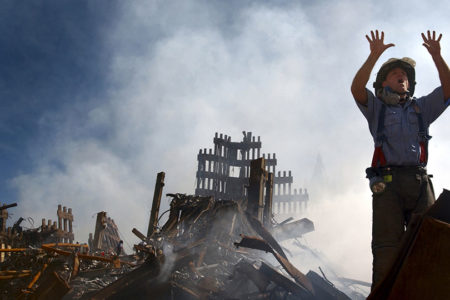When Terror Is Not ‘Terror’
Does abhorrence of terrorism depend on the nationality or religion of the victim? Are some lives less precious than others, so much so that the word terrorism would not apply to murderous attacks on these victims? To, say, Israeli victims?
Repugnant as such distinctions might seem, they are apparently employed by some of America’s leading media outlets, including The New York Times, The Boston Globe, and CNN. The Times, for example, in covering the October 3 attack against an Israeli community in Gaza in which two young Israeli civilians were murdered by Palestinian invaders, managed not even once to refer to the attack or to the attackers using any form of the word terror. This despite the fact that the “gunmen,” as the Times repeatedly called them, fired AK-47s at every civilian they saw and hurled grenades into homes.
And Hamas, the group responsible for the bloody attack, was delicately referred to as a “militant group,” not a band of terrorists.
Not that the words terror or terrorist are banned at the Times—on the contrary. On that same October 3, the Times used some form of the word terror in at least 93 stories (not counting paid obituaries). But in each case, the reference was to the terrible attacks in the United States on September 11, in which thousands of innocent Americans were killed.
Was it the number of dead, rather than their religion or nationality, that explains the difference in the Times’ usage? It seems not. The newspaper, for example, quite rightly used the word terror in reporting the attack against the USS Cole, even though the victims were relatively few in number and neither the ship nor its crew were civilian targets. An editorial on October 13, 2000, for example, referred to “an apparent terrorist attack.” On the same day, a Times report informed readers that the Cole was refueling in Yemen “despite its history as a haven for terrorist groups,” and added that “if confirmed as a terrorist attack, it would be the worst against American military forces since the bombing of an Air Force barracks in Saudi Arabia.”
Yet attacks against Israelis—in their homes and communities— receive radically different treatment. The killers are routinely termed “militants” or “activists”; and the groups that train, equip, and send them on their “missions” are regularly referred to in a similarly antiseptic manner.
The point, of course, is that the nation’s leading newspaper has decided that the killing of Jewish Israelis by Islamic-inspired murderers is somehow different than when very similar killers instead target Americans. One can only imagine that, to the Times, Israelis are somehow guilty either of oppressing Palestinians or, perhaps, of some more ancient sin; so the killers, therefore, are not to be called terrorists.
Of course, the Times is not alone. The Times-owned Boston Globe has followed exactly the same pattern, referring repeatedly to the bombing of the Cole and, of course, to the recent attacks in America, as terrorism perpetrated by terrorists, while resisting such usage when the victims are Israelis. The attack on October 3, for example, was attributed by the Globe to “Palestinian attackers” and “gunmen,” who were sent by the “military wing of the Islamic militant group Hamas.” Certainly neither the Globe nor the Times has ever referred to any “military wing” of bin Laden’s Al Qaeda group.
At CNN the same pattern is evident. Speaking on October 3, anchor Bill Hemmer explained that with “Israeli tanks rumbling into northern Gaza,” the cease-fire seems to have “crumbled . . . the toll there, eight Palestinians and two Israelis dead after the fighting.” Of course, the Israelis didn’t die in any “fighting”—they were unarmed innocents cruelly executed by terrorist invaders. And if the cease-fire was in trouble, it was because of unprovoked Palestinian attacks, not Israeli retaliation.
The Mike Hanna report that followed only made matters worse, with the attackers described as “Palestinian gunmen” and the 18-year-old murdered woman described as an “Israeli soldier” as if she were an armed combatant. She was off-duty and strolling down a residential road with her boyfriend, who was also murdered.
Nowhere did CNN describe the murders or the murderers using any form of the word terror, despite the fact that most CNN reports these days are headlined “Target: Terrorism.”
Now is the time for these institutions—and any that follow similarly indefensible policies—to cease discriminating between terror’s victims. All deserve to be remembered as the innocent quarry of an identical scourge.






